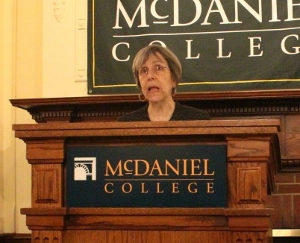The after being inducted into Phi Beta Kappa, my fun with PBK continued. On Monday night, Dr. Bambi Schieffelin, a linguistic anthropologist from NYU gave a lecture about linguistics as part of the Phi Beta Kappa Visiting Scholar Program. Through this program, a scholar spends two days at a college with a Phi Beta Kappa chapter. Schieffelin actually spent three days at McDaniel; she came to our PBK induction on Sunday, she gave a lecture on Monday night, and she answered student-generated questions on Tuesday during a luncheon for Honors Program students.
Schieffelin’s Monday night lecture was divided into two parts. In the first half, she talked about her time studying the Bosavi people in Papua New Guinea. In the Bosavi tribe, people are socially conditioned not to speak about others’ internal states of being, unless they heard about that state of being directly from the person or someone else who heard it directly from that person. So, for example, someone in the Bosavi culture who saw me laughing and smiling wouldn’t say, “Annie’s happy.” He would say, “Annie is smiling,” or confirm via me that I am in fact happy before making a claim to someone else about my internal state of being.
This may sound crazy to us, since in Western culture, we make surmises about people’s states of being all the time, nor are we linguistically required to cite our sources of information. This plays into how the “be + like” way to introduce someone else’s speech is something that we can even have in our language. What is mean by this is that I can say, for example, “He was like, ‘Woah! Slow down!'” The hypothetical person quoted in my example might have actually said that, or I might be exaggerating or performing what he said. Regardless of the words he actually said, the way I perform his speech conveys a certain type of information about the utterance. Schieffelin noted how astonishing that this “be + like” way of introducing someone’s language, either real or hypothetical, has become a part of everyday speech so quickly and has even migrated to text-based online interactions (her 2006 study focused on Instant Messaging, which also included a variety of ways to alter fonts and text color and size).
I got to talk to Schieffelin a bit after her lecture and I also asked her a question during Tuesday’s luncheon. I enjoyed the opportunity to “pick her brain,” so to speak, since she has a wealth of knowledge about linguistics, anthropology, and more. I love it when academic speakers come to campus and I love it even more when they are able to speak enthusiastically and accessibly about their areas of expertise with curious students like me!


Leave a Reply